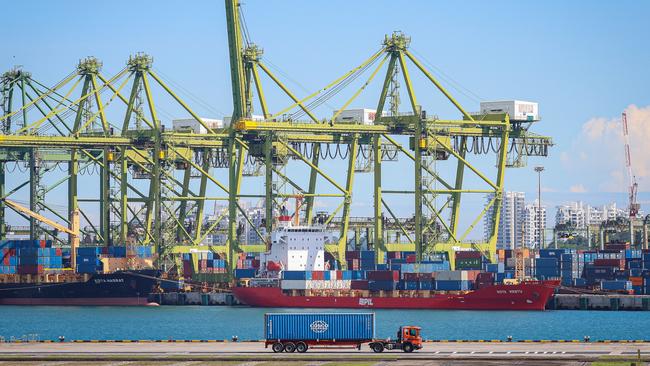I feel as an economic rationalist a bit lonely these days | Alexander Downer
Today many people think economic growth is a function of government spending. The more you spend the faster the economy will grow. The rationalist will realise you can’t create something out of nothing, writes Alexander Downer.

The three major themes of the 18th century Enlightenment were reason, scepticism and individualism. Those three drivers of society transformed Europe and spread beyond to America, Canada and Australia. They transformed societies from primitive medieval autocracies where most people lived in abject poverty for about 35 years … and then died. The Enlightenment cast aside the stale drudgery of life and injected hope of better living standards, reliable food, warm and dry housing, better health and longer life. Think about it.
It wasn’t superstition and emotion which drove this dramatic transformation; it was reason.
We can call those who believe in decisions based on reason rationalists.
Well, you’d have to say we’ve entered an era when reason and rationality has given way to emotion and superstition.

To make an economy grow you have to invest and that investment has to yield a positive return on the outlay. If you spend $1 million and make $1.1 million that’s growth. If you spend $1 million and it returns $950,000 that’s a recession.
Today many people think economic growth is a function of government spending. The more you spend the faster the economy will grow. The rationalist will realise you can’t create something out of nothing. The money spent has to come from somewhere and it needs to generate a positive return.
If it comes from taxes remember those taxed activities will become less viable and if the government is diverting resources from profitable activities to loss making endeavours then that detracts from growth.
Rationalists know that some resources need to be diverted to provide support for the less well off, for national defence and so on. We’re prepared to accept growth maximising isn’t our only national goal.
And then there’s debt. Australian politicians love to hand out generous electoral bribes particularly now – at election time! They don’t care that the government can’t afford them. They’ll just borrow the money.
The government pays interest on the loans. That chews up more of the budget leaving less available for the next generation. Politicians love to talk about building for your children and grandchildren. It sounds nice but they’re blowing their inheritance now! That’s not nice. But don’t worry.
The Americans and the Europeans are doing exactly the same thing. That doesn’t make it a good idea. But it just shows how economic rationalism has died a tragic death in recent years.
So too the once global consensus that free trade was axiomatic if you wanted to promote sustainable economic growth.
I know many economists will be outraged by President Trump‘s imposition of tariffs on all of America’s trading partners.
It’s a bad policy but if you think there is a constituency in America gagging for free trade, there isn’t.

The opposition Democratic Party has always been squeamish about free trade and their argument today isn’t that they oppose tariffs, it’s just that President Trump is doing it badly. That’s a typical argument of an opposition political party which just makes you roll your eyes.
Trump has a point. Whereas until his recent announcements the European Union‘s average tariff rate on American imports was close to 10%, America’s tariff rate on European imports into America was only 2.25%.
China imposes numerous trade restrictions as do major economies like India and Brazil.
But that’s not a rational way of looking at the problem.
It’s always in a country‘s interest to obtain goods and services at the cheapest possible price. Just producing them at home – that is, pursuing a policy of import substitution – has been tried in South America for generations.
Most African countries have also gone down that track. That has been a total failure for all the countries around the world which have thought that supporting their producers was more important than supporting their consumers. The economic rationalist would always put the consumers first.
And finally there is the irrational obsession with net zero. No cost benefit analysis has been done on the various policies being pursued.
For much of Europe, as well as Japan and Australia, there has been an irrational view that windmills will solve the problem.
They won’t. They only provide intermittent power and only once you build the transmission lines at very great expense.
The rationalist would say that if you want to reduce CO2 emissions worldwide – and that is the challenge, not just doing it nationally which has next to no effect – then there would have to be a worldwide emissions trading scheme.
Politics will ensure that will never happen.
The second-best alternative is to invest in R & D in areas such as nuclear power, carbon capture and storage and power storage schemes, including much more efficient and enduring batteries. There’s no point in saying these are too expensive at the moment.
So are a bunch of windmills and solar panels.
The rationalist would say put your money into R & D, finance adaptation for climate change, which has to be supported in any case, and for the rest make sure consumers have access to cheap energy in the meantime.
Anyway, I feel as an economic rationalist a bit lonely these days. But, as they say, perhaps when everything else has been tried and shown to fail, common sense will direct us back to rational considerations of policy rather than emotional and fashionable fads.
More Coverage
Originally published as I feel as an economic rationalist a bit lonely these days | Alexander Downer






